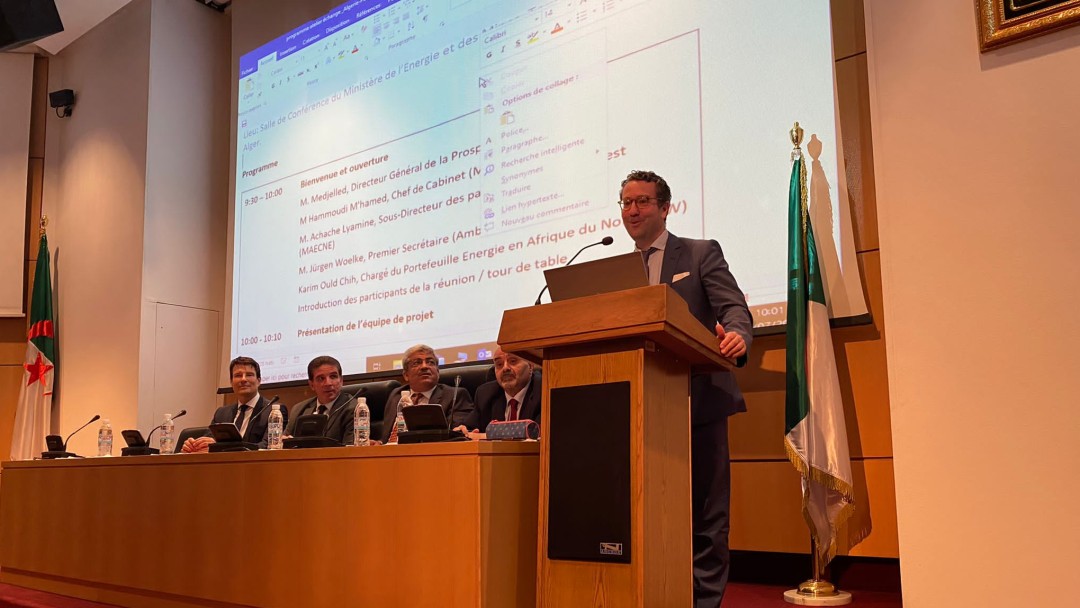News from 2022-07-21 / KfW Development Bank
Power-to-X - potential also in Algeria

In September 2021, Algeria and Germany agreed to deepen cooperation in two thematic areas: Private sector and financial sector development and renewable energies. On 20 July 2022, a workshop was held in Algiers with Algerian ministries, the Fraunhofer Institute and KfW Entwicklungsbank to explore the possibilities of producing green hydrogen.
35 representatives from the Algerian Ministry of Foreign Affairs, the Ministry of Energy and Mines, the Ministry of Energy Transition and Renewable Energies, the Ministry of Industry and the Ministry of Higher Education as well as the Fraunhofer-Gesellschaft and KfW Development Bank took part. From the Algerian side, the General Director for Prospection of the Ministry of Energy and Mines, Mr. Medjelled, and the Head of Cabinet of the Ministry for Energy Transition and Renewable Energies, Professor Hammoudi, opened the workshop.
KfW commissioned the Fraunhofer-Gesellschaft to conduct a study entitled "Assessment and analysis of the power-to-X market and investment opportunities for Algeria". Scenarios are being developed that include the assessment of renewable energy resources, an analysis of the potential for green hydrogen production, the identification of potential sites, the calculation of costs for hydrogen production and transport, and the assessment of sustainability. "The workshop went great," reports Karim ould Chih, responsible for the project at KfW. "The Algerian partners are aware of the potential of green hydrogen for the development of their country and are actively involved in the implementation of the study."
The German-Algerian Energy Partnership was established back in 2015 and aims on the one hand to contribute to the global energy transition and on the other to support Algerian efforts to expand renewable energies. Algeria has a high potential for renewable energies, especially wind and solar energy, which currently is almost not being used. The average annual solar radiation is 2,650 kilowatt hours (kWh) per square metre, in the south of the country over 3,000 kWh per sqm. For comparison: in Germany, solar radiation is around 1,000 kWh! In addition to very good conditions for the generation of renewable energies, there is an excellent logistical infrastructure along the north coast of Algeria with around 15 ports, an extensive gas network and numerous refineries.
Green hydrogen is one of the most promising energy alternatives of the future. It is considered the decisive next step in the energy transition. Alternative fuels are indispensable for limiting global warming to a tolerable level, especially for energy-intensive industries that are difficult to electrify, such as steel production or heavy goods transport. Hydrogen is a versatile energy carrier. It is already used today, especially in the chemical industry, but it is not yet climate-neutral. It can be used in fuel cells or as a basis for synthetic fuels. It can also be used to store surplus renewable energy (power-to-X). However, a lot of electricity is needed to produce hydrogen using the electrolysis process. It is therefore even more important that the electricity comes from renewable sources, because only then is the hydrogen "green". Hydrogen is an opportunity for Algeria to give further impetus to the expansion of renewable energies.
In terms of area, Algeria is the largest country in Africa and the most populous in the Maghreb. The economy is heavily dependent on oil, natural gas and petrochemical products - an economic risk due to strongly fluctuating world market prices. These raw materials account for about 95% of exports and provide 60% of government revenues. Fossil reserves are still available: Algeria ranks 11th in the world for proven natural gas reserves and 16th for oil. Currently, some European countries - including Germany and Italy - are very interested in Algerian gas as a substitute for Russian supplies. In the medium term, however, Algeria wants to diversify its economy more and become independent of fossil fuels. The conditions, especially for solar energy, are excellent. In 2020, a "Ministry for Energy Transition and Renewable Energies" was created specifically for this purpose and was represented at the workshop together with the Ministry of Energy.

Share page
To share the content of this page with your network, click on one of the icons below.
Note on data protection: When you share content, your personal data is transferred to the selected network.
Data protection
Alternatively, you can also copy the short link: https://www.kfw-entwicklungsbank.de/s/enzBWrMC.CvvA
Copy link Link copied